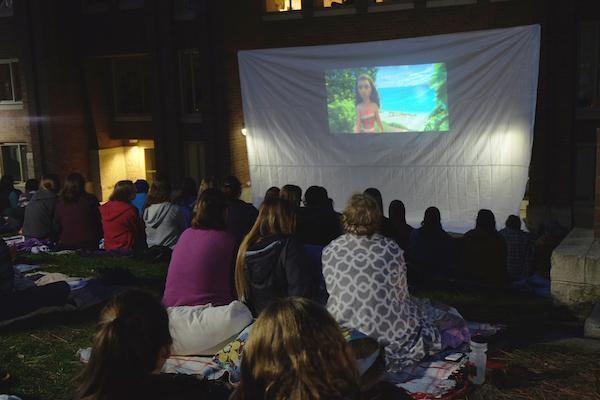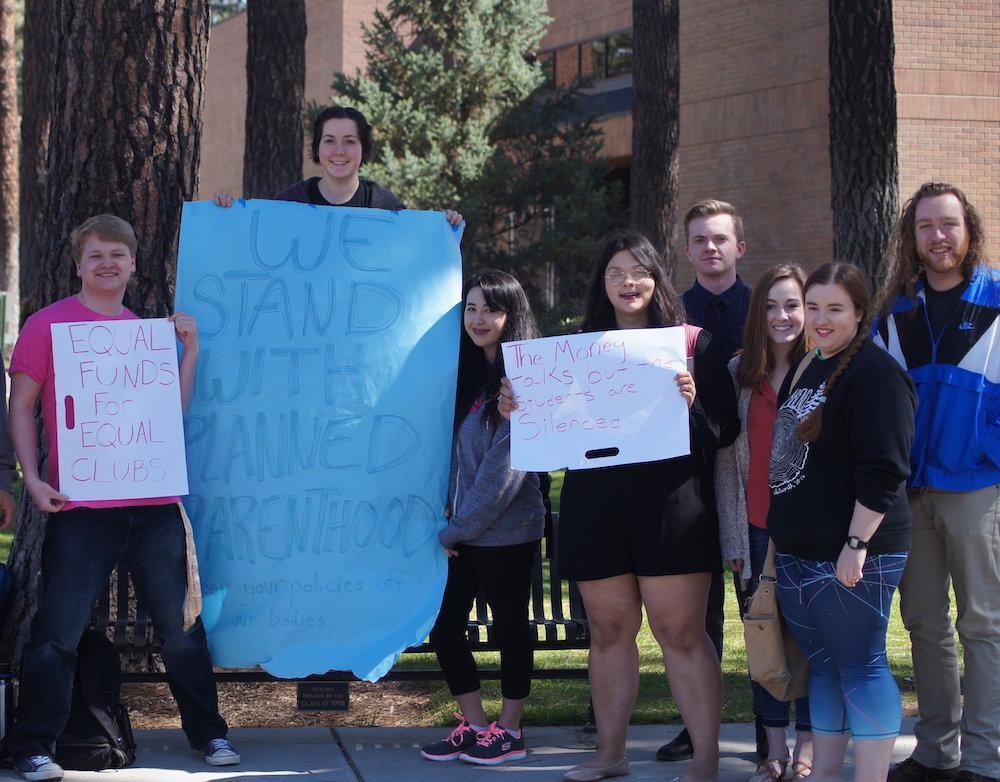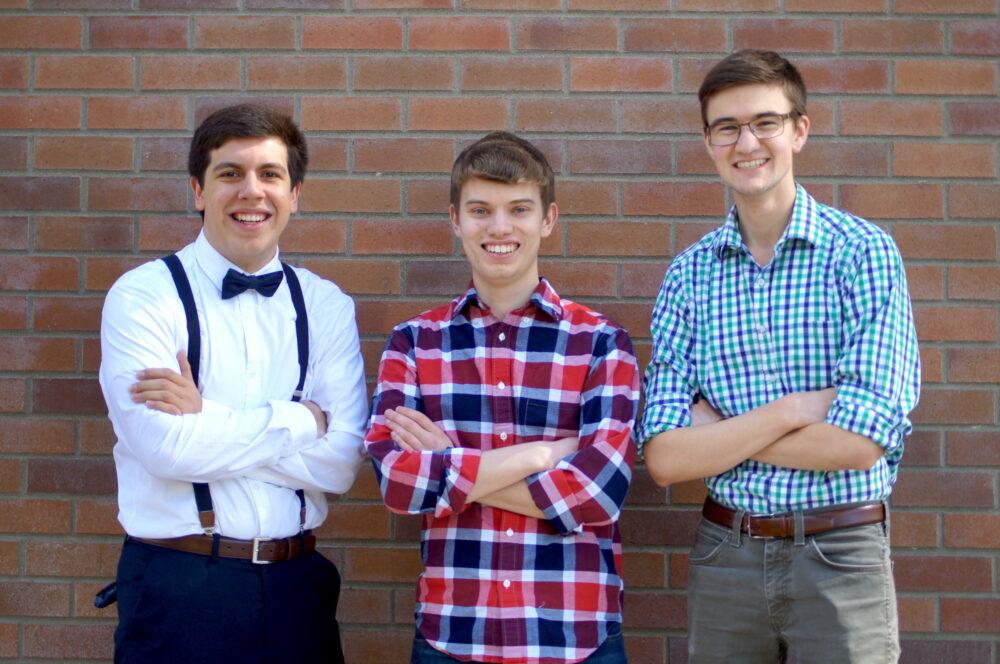Justice for women and sacred creation informed Taylor’s decision
Karlin Andersen|Editor-in-Chief
More than half of the Seeley G. Mudd Chapel was full Monday afternoon with Whitworth community members from a mix of sides on President Beck Taylor’s decision to sever the university’s formal relationship with Planned Parenthood. Taylor opened with statement before the question and answer session, summarized here, that lasted more than an hour.
“As a Christian institution of higher learning, Whitworth should stand for many things. One of them should be equality and justice for women. Another is life,” Taylor said, using those two points as a framework for his reasoning behind last week’s decision.
Taylor quoted Galatians 3:28 to outline Jesus’ work in improving women’s place in culture and the continued work of Christians today to fight for women’s rights.
“Much more work remains, on this campus and around the world,” Taylor said.
Life, Taylor said, is a sacred creation, “and that there’s nothing more valued and loved by God than human beings, each one made in God’s image.” Taylor referenced Psalm 139 and Jeremiah 1:5 which he said reinforces those beliefs about the human connection to God and the intentionality behind creation.
“So as a campus community grounded in a mission that seeks to ‘honor God, follow Christ, and serve humanity,’ elevating both of these values can, and some would argue should be, part of our work together,” Taylor said. “But many in our community question whether one justice must come at the expense of another injustice, and wonder whether popular culture has made it impossible to simultaneously be pro-women and pro-life.”
Some argue that while Planned Parenthood provides “important goods” in the form of health care to men and women, the abortions Planned Parenthood also performs conflicts the values of supporting women and valuing life, Taylor said.
“For many in the Whitworth community, it is simply inconceivable that a self-described Christ-centered institution would directly or indirectly support an organization that performs more than 300,000 abortions each year, despite the other beneficial services that organization provides to women and families,” Taylor said.
That conflict between equality and justice for women and life is what prompted Taylor to decide “that a formal relationship with Planned Parenthood wasn’t best for Whitworth’s attempts to finely tune our balance in order to provide constructive, generative spaces for people to disagree on this issue,” he said.
kandersen18@my.whitworth.edu
Statement to the Community on Planned Parenthood
Last week I informed you that Whitworth would no longer offer credit-bearing service-learning or internship opportunities with Planned Parenthood. As I said in my original statement, this was a very difficult decision for me, but that it best positioned the university, in my opinion, to live into its Christian and educational commitments while also allowing for robust disagreement on this issue. I know that many of you don’t agree with my decision, while many others of you have expressed your support. We are a divided campus, community, church and nation on this issue.
Although I was aware of disagreement on this campus around issues of abortion and choice, I was not aware that the university had a formal partnership with Planned Parenthood until last fall when The Whitworthian highlighted it. After investigating the details of the relationship, and after discussing its implications with cabinet members and trustees, and after much personal prayer and reflection, I decided that I would have never endorsed, nor would the board of trustees ever allowed, such a partnership to exist in the first place, as it represents for me, and for the board, a step too far toward one side in this contentious political, social, and moral controversy.
It’s important for me to acknowledge that my decision isn’t about staking out the “correct” Christian claims on this issue. I know very faithful people, including many of you, who support Planned Parenthood, the broader pro-choice movement, and/or access to safe abortions. Rather than intending to cast judgement, my decision simply reflects the position that supporting Planned Parenthood on this campus is too contentious for many as we dialogue on this issue.
Please allow me to present at least one line of reasoning that could lead to my conclusion. Again, allow me to underscore that this isn’t the only way one could faithfully and thoughtfully approach this issue, but it is meant to highlight how some might see a connection to Planned Parenthood as a move too far in one direction, and that the removal of our formal relationship could restore an appropriate posture for the university to address more nuanced questions on this topic, some of which I’ll present later. Here is that line of reasoning:
As a Christian institution of higher learning, Whitworth should stand for many things. One of them should be equality and justice for women. Another is life.
Galatians 3:28 reminds us that in God’s economy, “There is no longer Jew or Greek, there is no longer slave or free, there is no longer male and female; for all of you are one in Christ Jesus.” This and other biblical passages persuade many Christians that the church should stand in opposition of forces that demean, marginalize and subjugate women. Jesus elevated the role of women in his culture, and many Christians have fought hard for the rights of women in today’s society. Much more work remains, on this campus and around the world.
Many in the church are persuaded that Christian scriptures also teach us that God’s creation is sacred, and that there’s nothing more valued and loved by God than human beings, each one made in God’s image. Psalm 139, a text from which I preached this spring here in chapel, reminds us that God carefully “knit” us together in our mothers’ wombs, that each person is “fearfully and wonderfully made,” and Jeremiah 1:5 confirms to many that the Creator knows us well, even before we are born. Throughout the millennia, many Christians have honored and sought to protect that which God has so intentionally and lovingly created.
So as a campus community grounded in a mission that seeks to “honor God, follow Christ, and serve humanity,” elevating both of these values can, and some would argue should be, part of our work together. But many in our community question whether one justice must come at the expense of another injustice, and wonder whether popular culture has made it impossible to simultaneously be pro-women and pro-life. Indeed, some would argue that organizations like Planned Parenthood have confused these ideals to the point that it is perceived that people who support the important goods that Planned Parenthood provides, including much needed access to quality women’s health care, must also support the practice of abortion. That is what makes Planned Parenthood so controversial to many, according to this line of reasoning. For many in the Whitworth community, it is simply inconceivable that a self-described Christ-centered institution would directly or indirectly support an organization that performs more than 300,000 abortions each year, despite the other beneficial services that organization provides to women and families.
Now, I don’t for a second believe that everyone here aligns herself or himself with the perspectives I’ve just shared, and again, I’m not suggesting that they are the correct way to approach these issues. But I can tell you honestly that these perspectives are indeed shared by many Whitworthians, and along with the persuasive arguments from pro-choice, pro-Planned Parenthood quarters, helped to form my decision that a formal relationship with Planned Parenthood wasn’t best for Whitworth’s attempts to finely tune our balance in order to provide constructive, generative spaces for people to disagree on this issue.
Some of you have expressed your disappointment that removing this relationship with Planned Parenthood is a signal that the university is privileging the pro-life position, or that it is moving the university farther from the “narrow ridge” of faithful disagreement. I concede that could be a valid perception. But I would ask how having a relationship with Planned Parenthood might look to others who could also see the participation with an organization that provides abortions as step off the “narrow ridge” in the other direction. Had we publically announced a new relationship with Planned Parenthood, there would be many people who could justifiably make some of the very same arguments I’m hearing today from those who object to my decision. It’s interesting that removing our relationship with Planned Parenthood has been seen as taking sides, but having that relationship with Planned Parenthood in the first place isn’t. It highlights a point that I know isn’t lost on many of you, and that is although the narrow ridge metaphor is a useful one, and I’m thankful for it, like all metaphors, it has its limitations. Perhaps we should see the narrow ridge more as an ideal and less as a practical and completely realized set of conditions.
That’s what makes this decision so difficult for me, as I see my most important role as president to sustain and advance the educational mission we cherish so deeply, and to allow the university to embrace its mission to be both open and faithful. Many good people may disagree with me, but ultimately, I’ve decided that our mistake was not removing the links between Whitworth and Planned Parenthood as we have done, but rather establishing those formal links in the first place. Again, I acknowledge that faithful, thoughtful people who care for Whitworth as much as I do can disagree with my decision, and I respect that. But, alas, the burden falls to me.
Before I conclude and take your questions and comments, I want to reiterate some of the commitments I made in my original statement. First, this decision is in no way intended to infringe upon the rights or freedoms to disagree on this or any other controversial issue. Whitworth is a university, and as such, we should welcome opinions and perspectives contrary to our own. Faculty members and students have the academic freedom and responsibility to explore and create. Speakers and artists, even those from Planned Parenthood or other pro-choice and pro-life groups, will be welcomed to campus to promote healthy and constructive dialogue.
Let me give you just a few of the moral and theological questions that I hope we can tackle together as we engage in critical thinking on these difficult issues:
- Are there instances when abortion is the least tragic action to take in our fallen world? If so, what are those circumstances? Who is in the best position to decide when such circumstances are present? What would be the implications of the answers to those questions for laws concerning abortion?
What is the optimal relationship between legality and morality? Should everything that is immoral be legally prohibited? If not, which moral wrongs should be legally prohibited?
- What does a well-developed Christian theological ethic have to say about when a human fetus becomes a human person or human soul? What does such an ethic say about circumstances in which continuing a pregnancy is likely to cause the death of a pregnant woman? What does such an ethic say about the relationship of its moral requirements to how Christians should try to shape laws in a pluralistic society?
How should Christians support women with difficult pregnancies – pregnancies that are not just personally inconvenient, but which disrupt their employment or threaten their health, or pregnancies that result from rape, incest, or within abusive marriages?
- Is there any inconsistency, morally and biologically, in maintaining that contraception is morally permissible but thinking that abortion is always morally impermissible? Does the answer to that question vary depending on the method of contraception (IUD, condom, the pill, vasectomy, tubal ligation, abortifacients, etc.)?
Should all Christians be concerned about what past Popes have called a “contraceptive culture” in which whether and when to have children is too often viewed as on par with what kind of house to buy rather than as something that requires prayerful discernment? If so, what should Christians be doing about this?
These are just a few of the questions a Christian liberal arts university should be asking, and which point to moral and theological complexity rather than support conservative or liberal extremes.
Second, although the university has not approved a charter for a Planned Parenthood sponsored club on campus, I have asked Rhosetta Rhodes, Whitworth’s vice president of student life, to convene a representative task force to think more intentionally about how the charter-approving process, a process that involves both ASWU and the administration, can lead to a more equitable treatment of student organizations, specifically with respect to outside sponsorship and funding. I concede that this decision has highlighted for me and others some potential inequities, previously unrecognized, that need to be addressed sooner than later, and you have my commitment to do just that.
Finally, on a personal note, I know that people are upset with me. Others have voiced their support. But people in my role learn very quickly that leaders who only seek popularity often fail the people and organizations they steward. Some have tried to conflate the timing of my decision with our nation’s larger political discussions, or to even correlate the decision with my own political preferences, or with an attempt to assuage certain financial contributors to the university. I categorically reject those suggestions – indeed, on the last point, there are certainly easier ways to raise money than to knowingly incite controversy.
My biggest lament in all of this has been the way this decision has divided our community and caused some to question my commitments or the values and principles of this university. The intended educational outcomes of a university should not include agreement. But I do think one of our goals should be the fostering of understanding. My prayer is that Whitworth can continue to create and sustain a community of diverse and faithful perspectives, and that our community would be defined not by the intensity of our disagreement, but rather by the charity of our discourse.












 Spokane?
Spokane?